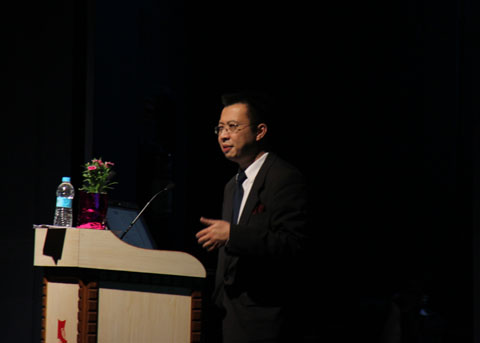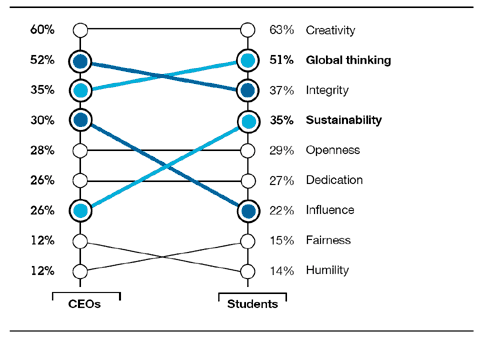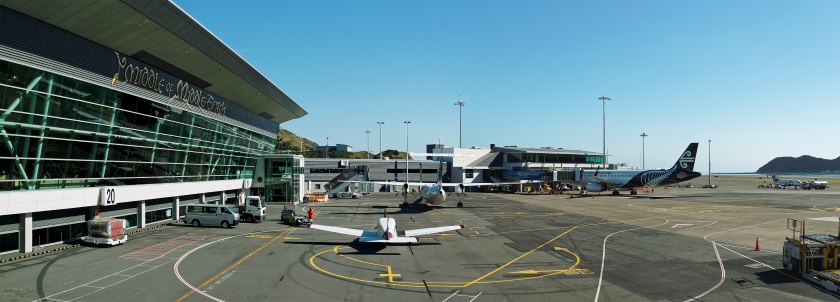
Symbiosis Institute of Media and Communication
I’ve had a wonderful time in Pune and Mumbai, two cities to which I had wanted to go for some years. Like some New Agers say: be careful what you put out into the universe. It can come true.
My main reason for going was to address the Knowledge Globalization Conference at FLAME in Pune. FLAME’s campus is remarkable: 1,000 acres, near a fancy golf course, and completely teetotal (which actually suits a social-only drinker like me). The scenery in the valley is stunning, and the sound of the water trickling down the mountain during the winter was particularly relaxing.
But as with any place one visits, it’s never the scenery that makes it: it’s the people. And in Pune I found a sense of optimism from all people from all walks of life, one which I hadn’t seen for quite some time.
I also ran into Deo Sharma from Sweden, whom I first met in 2002 in København. When there are coincidences like that, you know you’re on to a good thing.
Equally inspirational was addressing the Symbiosis Institute of Media and Communication. This talk, arranged through my friend Nishit Kumar—who learned I got a bigger buzz sharing knowledge than sitting on a beach relaxing—was attended by 600 students at different year levels. When you see a school like that, and students prepared to ask tough questions (both in person and later on Twitter), you feel encouraged that Pune has an incredible future ahead.
And before I advance to my next point, Mumbai was just as fantastic, and I need to acknowledge my old friend Parmesh Shahani, who let me stay with him in a home that beats some of the art galleries I have seen.
Everywhere you go in Pune, you see schools. A lot of tertiary institutions. Like so many Asian families, Indians place education highly. I had two parents who never seemed to go out on the town because we weren’t made of money, and everything they had went to my private schooling. I can well comprehend this mentality.
Which, of course, begs the question: why isn’t our country doing more in this sector with India?
I realize things are gradually changing as we incorporate more air routes directly to India and the government begins focusing on our fellow Commonwealth nation, but, as with capitalizing on the wave of Hong Kong emigration in the 1990s, I fear we might be too slow. Again.
This is nothing new. I’ve been saying it since the mid-2000s, on this blog and elsewhere. Privately I’ve probably been uttering it for even longer, before we nominated Infosys of Bangalore as one of our Brands with a Conscience at the Medinge Group.
And yet in the quest to get a free-trade deal with Beijing, we brushed aside India, a country with whom we have a shared heritage, a lingua franca, and a lot of games of cricket.
When I first went to India in 2008, one Indore businessman asked me: why on earth did New Zealand pursue the Chinese deal ahead of the Indian deal?
‘Follow the money,’ I swiftly answered, a response to which I got a round of applause.
I know the numbers may well have been in China’s favour, but sometimes, there is something to be said for understanding what is behind those numbers. And there is also something to be said for looking at old friendships and valuing them.
We can’t turn the clock back, nor might we want to, but it seems greater tie-ups with Indian education could be a great way to expose the next generation to more cultural sharing.
While in Pune, there was news of two Indian student murders in Manchester, which won’t have done the British national image a great deal of good. Australia already suffers from a tarnished image of racism toward Indian students, one which the Gillard government is hurriedly addressing with advertising campaigns featuring Indian Australians. It strikes me that there is an opportunity here in New Zealand, now that I have apologized for Paul Henry. Only kidding. I don’t think that I had much influence doing so unofficially, but I felt I had to get it off my chest, and I did apologize.
I was frank about it. I was frank about Henry, and I don’t mean Benny Hawkins off Crossroads. I was frank about the Indian immigrant who had to change his Christian name to something sounding more occidental before he got job interviews—prior to that he did not get a single response. But, I also noted, none of this would be out in the open in the mainstream media if New Zealanders, deep down, were not caring, decent people. The incidents would have been covered up.
Despite what we might think, most folks didn’t realize that we had a decent high-tech industry, that we are the home of Weta, and that Tintin, The Lord of the Rings and King Kong were local efforts. Although Players had only been out for three days by that point—and not to particularly good reviews, either—few realized a third of it was filmed in New Zealand.
They still think of sheep.
But there is a generation which, despite a huge domestic market and the optimism in their own country, wants an overseas experience, and the occident is still regarded as the place to do it in.
When they heard there was the possibility of high-tech jobs in a beautiful land, ears pricked up.
I realize the OECD stats say we’re average when it comes to innovation, but I know it’s there, under the radar, growing. People like Prof Sir Paul Callaghan reckon it’s the realistic way forward for our nation. Interestingly, this message sounds an awful lot like the one I communicated during my 2010 mayoral campaign.
And if we are to grow it, then maybe working with our Indian brothers and sisters is the exactly the direction we need to follow.





Sir,
With all due respect, the enriching seminar you conducted was at the Symbiosis institute of Media and Communication – UG as in undergraduate. The link you provided here is the website for the PG campus. The correct one would be:
http://www.simcug.edu.in/
Faizan, thank you for the link. I have duly corrected it in the post.